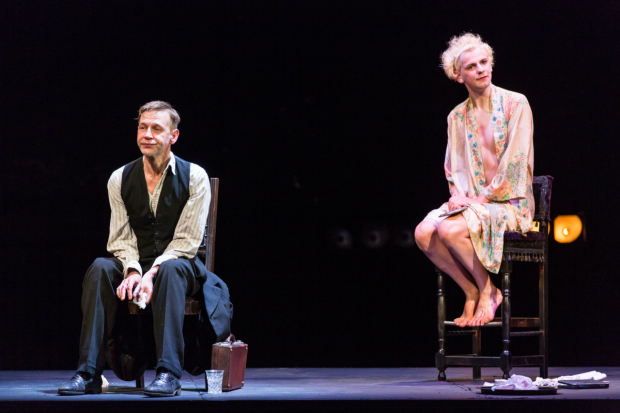Stella (Theatre Royal Brighton)

© Adam Weatherley
'As if it matters what century this happened in’ remarks actor number one at the start of Neil Bartlett‘s new play. Stella may tell a quintessentially Victorian history, from a time when homosexuality was illegal, music hall was raging, and women – both born and self-identified – trussed themselves up in silk, metal and bone. It may do this via some distinctively Wildean writing and a determinedly mannered performance style. But Bartlett insists from the off on his theme’s universal relevance. The mutability of gender, he suggests, is as timeless an issue as mortality.
Born in 1848 as Ernest Boulton, Stella was a glamorous young actress whose one-time lover was the Tory MP Lord Arthur-Pelham Clinton. In 1870 she was arrested in drag and charged with attempted sodomy. Public scandal followed, and Clinton mysteriously disappeared.
Bartlett toys with our expectations by making this play a two hander. Stella is now best known as one half of the Victorian cross-dressing duo, Fanny and Stella. But the other person on stage isn’t Fanny, or indeed her lover Clinton. The aging figure, sitting demurely in a man’s grey suit, is her 56-year-old self.
Divided by over 30 decades but only a metre of bare stage, Stella and Ernest are both waiting: he for a cab to take him to hospital, where he will finally submit to throat cancer; she in a dressing room, for Arthur. With a failing voice, Ernest shares their story to pass the time.
Sometimes time contracts and their contrapuntal speech becomes one narrative. Sometimes Bartlett sets the older and younger selves in ironic counterpoint. Oscar Battherham’s Stella makes herself up for her lover while Richard Cant’s Ernest strips himself bare for death. She is proud and flippant, he hesitant and particular. Both are brilliantly witty. There’s a metaphoric refrain of dressing and undressing, mirrors and reflections. ‘Life is best understood as a window display,’ says Stella. ‘The moments when no one’s watching you are all you really have,’ says Ernest.
It isn’t always easy to follow, but the stylised staging is powerful. Christopher Shutt’s sound effects emphasise sparingly, like expertly applied makeup. The sound of a mirror smashing marks time. The writing is formally beautiful but psychologically raw, driven through with splinters of emotional truth. Crucially, Bartlett’s research extended into the 21st century, in conversations with ‘people who perform or live in clothes and bodies different to those of the gender-role they were assigned to at birth’.
Representations of transgender and transvestite experiences may be on the rise. But they still tend to fixate on beginnings. Does the transformation begin when your wig goes on, people would ask Stella? Does your womanhood reside in the shoes? The voice? Bartlett radically refocuses our examination of gender identity on ‘the day the changing ends’. After all, as Ernest reassures Stella, ‘you can only die as yourself’.
Stella is one of the most important pieces to come out of Bartlett’s long relationship with Brighton Festival. His style may not be for everyone, but his themes are. If we could commune with our younger selves, Stella shows us, we’d realise that every identity is fluid. It’s just one step further to understanding that gender, like life, is a journey.
Stella runs at the Theatre Royal Brighton until 28 May. It then tours to Hoxton Hall as part of LIFT from 1 to 18 June.










